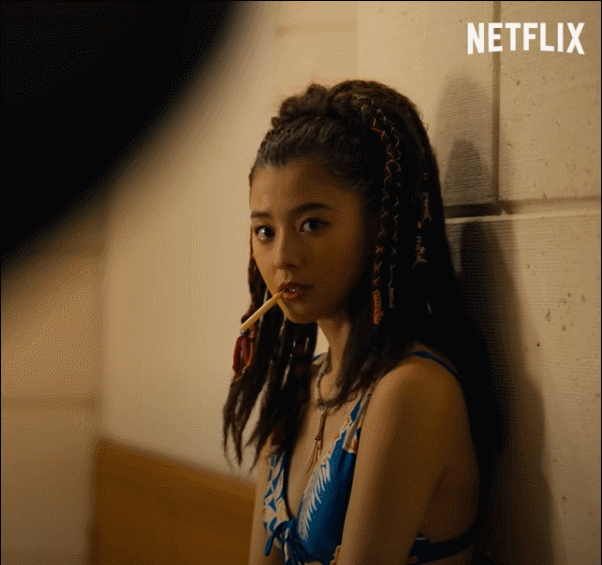Synopsis: “A group of bored delinquents is transported to a parallel dimension as part of a survival game.”
Don’t get me wrong.. Squid Game is a good show to binge through, but I hate to break it to you: Alice in Borderland is even better.
You know what? I’m not going to lie: 365 Days really did something to me. I might never be the same. I know y’all are eagerly waiting for a part two, but – seriously – it occurred to me that, perhaps, I needed a pallet cleanser before I got back in the game. Something thrilling, emotional, gut-wrenching… and is there a better show for that than Alice in Borderland? You might disagree with me, maybe you found Squid Game way better, or maybe you despise both because you absolutely hate shows that revolve heavily around bloody survival stories. Whatever the case may be, let me tell you why I’m such a huge fan of Alice in Borderland and why I love it so much more than Squid Game!

1. The Main Theme
Okay, okay, I’ll admit it: I’m an absolute sucker for survival games. Throw a bunch of characters with unique personalities together, let them compete against each other and you can bet your sweet bippy that I’m going to binge-watch it: The Hunger Games, The Future Diary, Darwin’s Game, Battle Royale, Squid Game… I’ve seen them all and I’ve enjoyed every single one of them. However, Alice in Borderland is my absolute favorite – hands down. Why? Well, one of the many reasons is the show’s overall plot.
It was some time ago, I had just finished Squid Game and was looking for something similar. A dark, well-produced thriller that keeps you on the edge of your seat from beginning to end. So, like any reasonable adult I turned to my old trusted guide and savior – Google. And what can I say? I found a true gem. Alice in Borderland, at its core, is about hope, healing, and re-learning the joys of being alive. Yes, on the surface the show seems like your typical survival thriller: lots of violence, gore, and bloodshed throughout the series. However, that’s not all there is to it.
Arisu, our main character, is a young, unemployed man with no aspirations in life. After the death of his mother, he spends his days either isolated in his room playing video games or strolling the streets with his two best friends Karube and Chota. One day, the three of them see a flash of fireworks in the sky and, suddenly, find themselves transported to a seemingly abandoned Tokyo-like city: Borderland. There they must participate in deadly games in order to survive. Players receive more so-called “visa days” by clearing games, represented by different playing cards. If they lose the games or their visa expires they die. While enduring loss and pain along the way, Arisu and numerous other characters make it through the games. In season 2, it’s revealed that the fireworks were – in fact – a meteor shower that destroyed most of the city. Reavealing that Borderland, as the name suggests, is a kind of purgatory between life and death, an in-between world where people on the verge of death are send to in order to decide whether they continue to the world of the dead or return to the world of the living.
Once Arisu beats the final game, all the residents of the Borderlands are given two options: 1.) staying in or 2) leaving the Borderlands. Arisu, just like most of our other main characters decides to leave. The latter wake up in a hospital with no direct recollection of the borderlands, each other or the games. However, I do firmly believe that – at least on a subconscious level – they do still feel a sort of connection to one another. Finally, Alice in Borderland ends with a close-up of the joker card, which some have interpreted as a tease for the third season, whereas others are convinced that it might simply imply that real life is the hardest game of all. Personally, I enjoyed that revelation so much more than Squid Game‘s more realistic approach.Yes, Squid Game touches on an incredibly real issue, but this has been done a zillion times before. Not to mention that the VIPs were another level of cringe. It hurt.
2. The Games
Simply put, I found the games in Alice in Borderland more unique, intriguing, and complex. It has more intense action, puzzles, and exciting twists that the games in Squid Game just can’t offer.
In Alice in Borderland every game has a different difficulty level and, overall, they fall under one of the four suits in a deck of playing cards: Hearts, Diamonds, Clubs and Spades. Heart games are psychological as they require “playing with the hearts of the other players”, Diamond games focus on intelligence, they usually include logic, rationality, numbers, math, and probability. Club games focus on teamwork and Spade games are physical, focusing solely on physical skills such as fighting, running, climbing etc.
If I’d talk about every single game, this blog post would be indefinite. However, let me tell you this: I firmly believe that the characters in Alice in Borderland had a better chance at winning than in Squid Game. Yes, the games in AIB are more complex but most of the games had an actual backdoor solution that gave everyone a chance to survive. Squid Game might be full of child games, but – as we know – Seong Gi-hun survived due to mere luck: he is saved by others numerous times, luckily ends up being the last one to hop off the glass tiles, gets missed by the glass shards and wins the final game due to Sang-woo ultimately killing himself. The games were made so there’s only one single survivor, it was predictable from the very beginning. In Alice in Borderland, on the other hand, Arisu isn’t the only survivor, nor was he meant to be.
3. The Characters
Listen. I do like some of the protagonists in Squid Game: Seong Gi-hun, Ali, Kang Sae-byeok, and – of course – Ji-yeong. Yes, I hear you, they might somewhat be more realistic than the characters in Alice in Borderland, which is a Manga adaptation after all. However, I felt like they lacked personality, and development. There’s barely any backstory to most of them and I just couldn’t connect to and grow an attachment to the characters the same way as I could in Alice in Borderland. I legitimately bawled my eyes out in the third episode of the first season. Watching a survival show, I have never gasped and cried and said “nonono” like I did with this. This HURT. So, all things considered, I’d say I like the characters in Alice in Borderland way more. In particular, I have two favorites:
Chishiya

Not to sound like an obsessed fangirl or anything, but Nijiro Murakami as Chishiya is a true work of art. What more can I say? Sorry, Arisu – you may be the main character and all – but Chishiya became my favorite as soon as I saw him: Yep, he is attractive, but that’s not why I adore his character to absolute pieces.
In fact, there are many reasons why I’m a fan of Chishiya, however, what intrigued me the most was his thought process. As someone who definitely couldn’t depend on my physical strength to survive (seriously, I cannot even open a freaking jar of jam), I love seeing characters like Chishiya, who aren’t that well-endowed physically but manage to get through by relying on their cunningness, observational & listening skills as well as intuition.
Kuina

Kuina is probably the most well-rounded character. Even Chishiya seems drawn to her and – to me – it might be the biggest tragedy of season 2 that we barely get to see them interact with one another. Nonetheless, Kuina is caring, supportive, and a true badass. Her battle with the Last Boss had me screaming.
“Kuina: I finally understand. I’ve always thought that you and I were similiar.
Last Boss: Me and you?
Kuina: Both of us despise our past. I’ve finally decided because of you. You just keep turning your back on your past. But I…I will face my past once more in order to survive!”
There’s such an important lesson there about facing your past and I don’t believe I’ve seen trans-representation quite like this before, it’s refreshing. She’s definitely not a token character, put in the show with little to no effort. Quite on the contrary: Kuina is relatable, even for non-queer folks. As long as I can remember I, too, have been chasing my mother’s approval and validation and her character rang true to me in that respect.
Bottom line: I love survival horror stories, and this is my favorite one.
